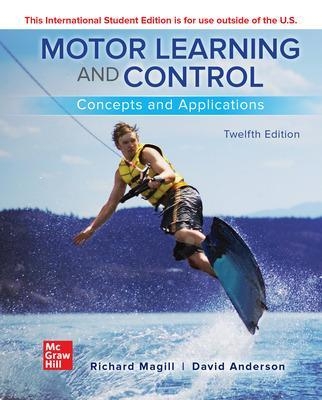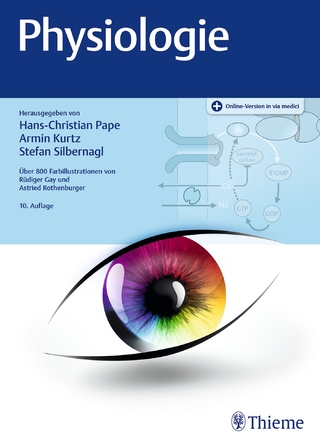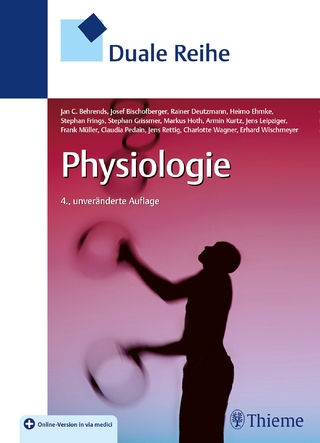
ISE Motor Learning and Control: Concepts and Applications
McGraw-Hill Education (Verlag)
978-1-260-57055-7 (ISBN)
Instructors and students can now access their course content through the Connect digital learning platform by purchasing either standalone Connect access or a bundle of print and Connect access. McGraw-Hill Connect® is a subscription-based learning service accessible online through your personal computer or tablet. Choose this option if your instructor will require Connect to be used in the course. Your subscription to Connect includes the following:
SmartBook® - an adaptive digital version of the course textbook that personalizes your reading experience based on how well you are learning the content. Access to your instructors homework assignments, quizzes, syllabus, notes, reminders, and other important files for the course. Progress dashboards that quickly show how you are performing on your assignments and tips for improvement. The option to purchase (for a small fee) a print version of the book. This binder-ready, loose-leaf version includes free shipping.
Richard A. Magill holds a Ph.D. in Educational Psychology with a specialization in Motor Learning from Florida State University. He is currently an Adjunct Professor in the Motor Learning and Control graduate program at Teachers College, Columbia University, in New York City. He is also an Adjunct Professor in the Dance Education and Physical Therapy graduate programs in the Steinhardt School of Culture, Education, and Human Development at New York University, also in New York City. He was formerly the Helen "Bessie" Silverberg Pliner Professor in Kinesiology and Coordinator of the Graduate Program in Kinesiology at Louisiana State University in Baton Rouge, Louisiana. His research focuses on understanding how motor skills are acquired and how practice conditions influence that acquisition. He has authored and co-authored numerous peer-reviewed articles, book chapters, and presentations. He is an Active Fellow in the National Academy of Kinesiology, in which he served as President. He also is an active member and former President of the North American Society for the Psychology of Sport and Physical Activity. Among his other professional service activities, he was Editor in Chief for Research Quarterly for Exercise and Sport, and he has served on the editorial boards of several journals focused on motor learning and control. David I. Anderson holds a Ph.D. in Kinesiology with a specialization in Motor Learning and Control from Louisiana State University. He is the Director of the Marian Wright Edelman Institute for the Study of Children, Youth, and Families at San Francisco State University and the former Chair of the Department of Kinesiology at San Francisco State University. His research centers on understanding how motor skills are acquired, how to promote the development of motor skills, and how motor activity influences psychological functioning and academic performance. He has authored and co-authored numerous peer-reviewed articles, book chapters and presentations, and has received significant funding for his research from the National Institutes of Health, the National Science Foundation, the Department of Education, and private foundations. Dr. Anderson received the Distinguished Faculty Award for Excellence in Professional Achievement and Growth from San Francisco State University. He is an Active Fellow in the National Academy of Kinesiology and the former President of the North American Society for the Psychology of Sport and Physical Activity. Among his other professional service activities he is an Associate Editor for Research Quarterly for Exercise and Sport and he serves on the editorial boards of several journals focused on motor learning, control, and development.
Preface
Dedication
UNIT ONE Introduction to Motor Skills and Abilities
1 The Classification of Motor Skills
2 The Measurement of Motor Performance
3 Motor Abilities
UNIT TWO Introduction to Motor Control
4 Neuromotor Basis for Motor Control
5 Motor Control Theories
6 Sensory Components of Motor Control
7 Performance and Motor Control Characteristics of Functional Skills
8 Action Preparation
UNIT THREE Attention and Memory
9 Attention as a Limited Capacity Resource
10 Memory Components, Forgetting, and Strategies
UNIT FOUR Introduction to Motor Skill Learning
11 Defining and Assessing Learning
12 The Stages of Learning
13 Transfer of Learning
UNIT FIVE Instruction and Augmented Feedback
14 Demonstration and Verbal Instructions
15 Augmented Feedback
UNIT SIX Practice Conditions
16 Practice Variability and Specificity
17 The Amount and Distribution of Practice
18 Whole and Part Practice
19 Mental Practice
Glossary
References
Name Index
Subject Index
| Erscheinungsdatum | 29.04.2020 |
|---|---|
| Zusatzinfo | 101 Illustrations |
| Verlagsort | OH |
| Sprache | englisch |
| Maße | 185 x 231 mm |
| Gewicht | 796 g |
| Themenwelt | Studium ► 1. Studienabschnitt (Vorklinik) ► Physiologie |
| Naturwissenschaften ► Biologie | |
| ISBN-10 | 1-260-57055-X / 126057055X |
| ISBN-13 | 978-1-260-57055-7 / 9781260570557 |
| Zustand | Neuware |
| Haben Sie eine Frage zum Produkt? |
aus dem Bereich


